|
|
|
Sort Order |
|
|
|
Items / Page
|
|
|
|
|
|
|
| Srl | Item |
| 1 |
ID:
121109
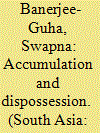

|
|
|
|
|
| Publication |
2013.
|
| Summary/Abstract |
Space and its reconstruction has emerged as one of the foremost devices of capitalist development. In this context, this paper attempts to develop a critique of the prevailing logic of 'development' in India. It argues that the contextual realities of the current exclusionist economic policy in India are defined not only by the nexus of the neo-liberal policy regime and disciplinary political authority, but also by the resistance and struggles of the dispossessed.
|
|
|
|
|
|
|
|
|
|
|
|
|
|
|
|
| 2 |
ID:
140249


|
|
|
|
|
| Summary/Abstract |
This article proposes that the Emergency counterinsurgency campaign of the British colonial state should be viewed as a conjunctural episode of dispossession of Malayan laboring people. Conjunctural episodes of dispossession of working people through state violence and racialized rhetoric emerge as a response to crises in capitalist accumulation occurring at multiple and overlapping scales of capitalist systems – the imperial, the national/colonial, and the local/regional. During these episodes state and capitalist strategies destroy political organizations and solidarities among laboring people and demoralize them over long periods of time, through processes simultaneously material and semiotic. Employing new theorizations of the global anthropology of labor, this article first examines the postwar and Emergency years when the multiethnic and industry-wide bases of Malayan trade unions were destroyed while an estimated half a million working people were forcibly concentrated in so-called New Villages. This had the effect of suppressing a discourse of class and class struggle in favor of a dominant discourse of ethnic conflict. In an effort to articulate class struggle despite the presence of this dominant discourse of essential ethnic difference this essay examines the formation of a new working men's “society” in 1978–1980 and a dispute between truck drivers and truck owners in northern Malaysia.
|
|
|
|
|
|
|
|
|
|
|
|
|
|
|
|
| 3 |
ID:
081861
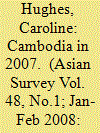

|
|
|
|
|
| Publication |
2008.
|
| Summary/Abstract |
This year saw continued economic growth but increasing discontent over inequality and dispossession. Mindful of upcoming elections, Prime Minister Hun Sen declared a "war on land-grabbing," with little practical effect. Infighting within the political opposition consolidated the government's electoral prospects, while the protests of the poor were forcibly suppressed.
|
|
|
|
|
|
|
|
|
|
|
|
|
|
|
|
| 4 |
ID:
173333
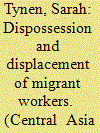

|
|
|
|
|
| Summary/Abstract |
The media often focuses on the visible aspects of state violence. However, the invisible aspects of everyday struggle often go under-reported. How does dispossession and displacement occur for Uyghurs in Xinjiang? What is the role of their dispossession in securing state territorial control? Some Uyghurs from rural areas in Xinjiang, China have experienced a triple dispossession: displacement from the countryside, alienation in the city, and eviction from the city. The stories concern the agony people feel as they move from rural to urban settings and back again, pain caused by severe hardship in the economic, political and cultural senses. This case shows how economic development works together with interventionist state power to violently dispossess and displace the most vulnerable poor minorities from their homes and livelihoods.
|
|
|
|
|
|
|
|
|
|
|
|
|
|
|
|
| 5 |
ID:
121111
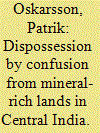

|
|
|
|
|
| Publication |
2013.
|
| Summary/Abstract |
Bauxite mineral projects in central India have in recent years generated conflicts over both the physical environment and equitable development for very vulnerable people. In one such project, a joint venture between the state government of Andhra Pradesh and a private investor, attempts are currently being made to open up land constitutionally reserved for India's Scheduled Tribes. The final outcome, though still uncertain, depends not only on the relative material resources of the opposing parties, but on a drawn-out process of contestation where the discursive resistance to tribal land dispossession has strong historical roots and many active supporters. Thus, for the project's promoters, their advantage rests on their ability to create confusion via superior access to, and control over, information, rather than relying on their direct authority.
|
|
|
|
|
|
|
|
|
|
|
|
|
|
|
|
| 6 |
ID:
193297


|
|
|
|
|
| Summary/Abstract |
The term disruption has become a buzzword for our times, although there is little clarity over what the term means, how it is deployed, and towards what ends. In order to understand the analytical and political stakes that are embedded in the deployment of ‘disruption’ as a rationale for various sources of upheaval, in this article I argue that these three terrains of disruption should be understood as theories of governance, and term them ‘disruption from above’, ‘disruption from the middle’, and ‘disruption from below’. Each terrain of disruption embodies different ethoses, actors, and goals: the first connoting elite-driven creative destruction and innovation; the second obfuscating the capitalist imperative that produces world-systemic upheavals; and the third seeking to expose the structures of violence and inequality built into such practices. I illustrate these three terrains through a structural account that traces the popularity of the disruption discourse from its origins to its material application; analyse an illustrative example of the assetisation of infrastructure and how it bureaucratises governance and shifts relations of power; and conclude by examining infrastructural forms of protest against such forms. I argue that the confusion over what disruption means, who exercises it, and upon whom is not a coincidence: rather, disruption's polysemy is structurally produced as a way to disguise ongoing capitalist crisis as a technical problem that market innovations can solve.
|
|
|
|
|
|
|
|
|
|
|
|
|
|
|
|
| 7 |
ID:
141326
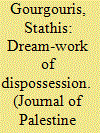

|
|
|
|
|
| Summary/Abstract |
Essentially a cinema of occupation and dispossession, Palestinian cinema disrupts standard notions of national cinema, complicating conventional expectations of national aesthetics or national dreams. As the borders of Palestine’s historical territory are continuously under erasure, so too are the symbolic boundaries of its language, which is flexible and inventive; the language of Palestinian cinema is a limit-language. No one has expressed this “limit condition” more succinctly than Elia Suleiman, whose cinematic language exemplifies a poetics of dispossession that depicts the asphyxiating spaces and truncated temporalities of Palestinian life with tragic humor and bold fantasy in defiance of narrative simplicity. Suleiman’s films run counter to the conventional representation of Palestinian existence and are arguably the sharpest expressions of what can be deemed to be the dream-work of that existence against its conventional representation.
|
|
|
|
|
|
|
|
|
|
|
|
|
|
|
|
| 8 |
ID:
174816
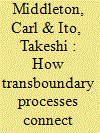

|
|
|
|
|
| Summary/Abstract |
In this paper, with a focus on Japan and Thailand, we outline a relational environmental and economic history of East Asian economic integration (EAEI) and its implication for the commons in both places. We draw attention in particular to global commodity chains as relational processes not only of trade and investment, but also geopolitics and aid, to argue that these transborder processes have connected together commons in distant localities resulting in their simultaneous enclosure, dispossession and (re‐)commoning with implications for community vulnerabilities in positive and negative ways. To demonstrate this argument we analyse three periods of EAEI: the late nineteenth century until World War II, when Japan and Thailand both began to modernise and new trade and geopolitical relations emerged in the context of colonialism; the post‐World War II recovery until the Plaza Accord in 1986, during which time Japan rapidly industrialised, as did Thailand to a lesser extent and regionalism was largely defined by US hegemony; and the post‐Plaza Accord period, when Japan deindustrialised its labour intensive manufacture and heavy industry and Thailand rapidly industrialised and EAEI became defined by new and intensified global commodity chains.
|
|
|
|
|
|
|
|
|
|
|
|
|
|
|
|
| 9 |
ID:
180230
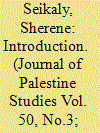

|
|
|
|
|
| Summary/Abstract |
Journal of Palestine Studies coeditor Sherene Seikaly introduces a cluster of essays by Sreemati Mitter, Alex Winder, Charles W. Anderson, and Haneen Naamneh that examines Palestinian “history from below.” The focus of these essays is on the everyday losses endured and the community-based forms of resistance enacted by ordinary Palestinians. Seikaly explains how, through the struggle against financial dispossession, the journey into insurgent law, broad-based collective civil disobedience, and Arab futurity in Jerusalem, these four essays make space for new understandings in the way we narrate Palestine, its history, and its people.
|
|
|
|
|
|
|
|
|
|
|
|
|
|
|
|
| 10 |
ID:
180231
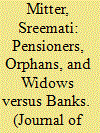

|
|
|
|
|
| Summary/Abstract |
This essay attempts to rectify the silence about the willful expropriation, by British and Israeli forces, of private Palestinian financial assets. Placing at its core the stories of ordinary Palestinians, it explores how they were robbed of their bank accounts, bonds, stocks, pensions, salaries, and safety deposit boxes during the creation and termination of the Palestine Mandate (in both 1917 and 1948). The essay argues that the basic financial structure of colonization, which deprives the colonized of the protection of sovereign banking institutions, facilitated these thefts. It also argues that the supposedly neutral rules of finance acted as a fig leaf to such dispossessions. Based on archival research and oral histories, it presents a new social history of finance that centers the experiences and subjectivities of non-elite Palestinians who strove to defend themselves and assert their rights, individually and collectively, during pivotal moments of violent upheaval and rupture.
|
|
|
|
|
|
|
|
|
|
|
|
|
|
|
|
| 11 |
ID:
176582
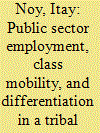

|
|
|
|
|
| Summary/Abstract |
India's adivasi, or tribal, communities have most often been depicted as homogeneous and egalitarian, at least compared to the entrenched social hierarchies that characterise rural caste society. This article draws on fieldwork in a mining-affected adivasi village in Jharkhand, eastern India, to consider how compensatory public sector employment for mining-induced land dispossession has contributed to new processes of stratification within adivasi society. On the one hand, compensatory employment allowed those who attained it to pursue increasingly common middle-class aspirations, and a considerable degree of class mobility. But on the other hand, it fostered new, enhanced forms of intra-adivasi differentiation – not only in terms of income but also consumption and lifestyle, education and children's life chances, and household and gender dynamics. New internal disparities, in turn, have acted to erode pre-existing elements of adivasi society that revolve around values of egalitarianism.
|
|
|
|
|
|
|
|
|
|
|
|
|
|
|
|
| 12 |
ID:
165926
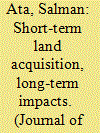

|
|
|
|
|
| Summary/Abstract |
Pakistan provides seasonal hunting permits to the rulers of Gulf countries for hunting of Asian Houbara bustard (Chlamydotis macqueenii) in different parts of the country. This research deals with (transnational) seasonal land acquisition of different rangelands/deserts of the Punjab province of Pakistan. So far, no comprehensive research has been conducted in Pakistan on this issue. This research attempts to address the impact of seasonal land grabbing by the foreigners on livelihood assets of local stakeholders in South Punjab, Pakistan. Based on the idea of ‘control grabbing’, this research uses ‘sustainable livelihood framework’ as an analytical framework. Quantitative and qualitative data were acquired from three (out of a total nine) randomly selected hunting sanctuaries in the districts of Rajanpur and Dera Ghazi Khan. The results revealed that natural assets of local population (agricultural land and rangeland) are adversely affected during the entire hunting season. Limited access to natural assets (especially livestock fodder) has long-term negative impacts on livelihood diversification of the locals as the number of livestock – one of the most important assets of respondents – is continuously decreasing in the case study area. We recommend that land enclosure should be restricted to a limited area for a limited time, and that the Government should develop an effective monitoring and evaluation system.
|
|
|
|
|
|
|
|
|
|
|
|
|
|
|
|
| 13 |
ID:
186307
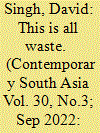

|
|
|
|
|
| Summary/Abstract |
Renewables are imagined in India around features of ‘greenness’ and ‘cleanness’ and are presented as the modern pathway towards sustainable development and unlimited growth. But this shining story entails problematic land politics and the related (un)making of space for capital accumulation: previous property regimes and land uses are erased while a new set of land technologies and territorial rules legitimates land dispossession and the private takeover of commons. Wind infrastructures are specifically targeting (common) lands categorized as ‘deserted’, ‘empty’ and ‘waste’, and subaltern groups (tribal, pastoral and Dalit communities) whose livelihood practices have been historically described as ‘unproductive’ and ‘backward’. These both violent and discursive logics of (neo)colonial and green energy land politics are mediated and fixed to the ground levels by powerful (land) brokers, contractors, wind companies’ land teams and political mediators who embark land on its tortuous, bureaucratic and yet material journey towards clearing, cleaning and holding value. This article offers perspectives from political geography and critical agrarian studies to understand the territorial process, the persistence of class-caste relations and the legacy of coloniality underlying the land politics of green energy development in borderland India.
|
|
|
|
|
|
|
|
|
|
|
|
|
|
|
|
| 14 |
ID:
187289
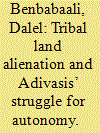

|
|
|
|
|
| Summary/Abstract |
Based on a case study of the Bhadrachalam Scheduled Area of Telangana, this article argues that the Adivasis of Central India seek autonomy as a response to their dispossession and to the accumulation of capital taking place in their resource-rich territories. The two main factors that have curtailed Adivasi autonomy through land alienation are analysed. The first is a process of agricultural colonization, wherein settlers belonging to agrarian dominant castes have moved into Adivasi territory and acquired tribal lands, thus dispossessing the original owners and reducing them to daily wage labourers. The second process is the industrialization of tribal areas where raw material is available and manpower is cheap, allowing for rapid accumulation through the exploitation of both nature and labour. Adivasis’ struggle for autonomy is therefore a way to reclaim control over their own resources and to preserve their distinct identity.
|
|
|
|
|
|
|
|
|
|
|
|
|
|
|
|
| 15 |
ID:
157094
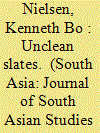

|
|
|
|
|
| Summary/Abstract |
This article interrogates the discourse of ‘greenfield development’ in contemporary India with special reference to the development of a greenfield airport in Goa. By unpacking the conflictual process between carrying out and challenging environmental impact assessments (EIAs) in connection with large-scale infrastructure projects, the article analyses the EIA process as one that simultaneously induces the articulation and territorialisation of the discourse of greenfield development in particular environments, with far-reaching consequences in terms of environmental change and land dispossession.
|
|
|
|
|
|
|
|
|
|
|
|
|
|
|
|
| 16 |
ID:
193196


|
|
|
|
|
| Summary/Abstract |
Frontier making in Ethiopia has historical roots from the formation of the modern Ethiopian state in the late-19th century through wars of conquest. The conquest, which was inspired by political and economic motivations of the highland Christian kingdom, used the notion of a “civilizing mission”—civilizing the “backward” and “underdeveloped” people, and “underutilized” spaces—through imposition of an imperial state system and Orthodox Christianity. The foundation and horizontal expansion of Addis Ababa or Finfinne by displacing Indigenous inhabitants was part of the state building project under successive regimes. Over the last century and a half, the city has continued its unchecked expansion in a process involving multilayered actors whose interests overlapped in terms of grabbing the land they considered “underutilized.” More specifically, the last three decades evince commoditization of farmlands, grazing areas, and cultural and sacred spaces through land lease, which eventually dissolve existing customary systems, values, and practices. This paper critically analyzes the dynamics of frontier making in or from Addis Ababa or Finfinne, the political economy behind such unchecked frontier expansion and how it activated the power of resistance in 2014. The paper concludes that frontier making in or from Addis Ababa through dispossession of Oromo farmers has been part of the broader political establishment in Ethiopia and should be viewed within the same lens.
|
|
|
|
|
|
|
|
|
|
|
|
|
|
|
|
| 17 |
ID:
105183
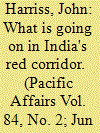

|
|
|
|
|
| Publication |
2011.
|
| Summary/Abstract |
Drawing on the small number of recent ethnographic studies, on reports by human rights activists, and on some reports by journalists, this paper explores reasons for the strength of the Maoist insurgency across the "red corridor": a large tract of India, from the border with Nepal through to the south. It finds that while the "feasibility thesis," as developed by Fearon and Laitin in particular, amongst recent general theorists of the determinants of civil war and insurgency, has explanatory power, there is also evidence of the significance of "grievance," especially amongst the tribal people of central India. The Maoists have certainly not always been the drivers of resistance to the many cases of realized or attempted dispossession across the region, but they seem to be sympathetic to movements of resistance, and often to articulate grievances against the state, both for what it has done (encouraging expropriation for mining, infrastructural and industrial projects) and for what it has not done (in the supply of basic services). The alternative "greed" hypothesis is found to be less strongly supported, though rents from the rich mineral and forest resources of central India do play a part in the story. The Maoists support people's aspirations but their supportive moves can be in contradiction with their broader strategic ambitions-of taking over state power-and the spiral of violence that often follows can end up betraying those whom they claim to support.
|
|
|
|
|
|
|
|
|
|
|
|
|
|
|
|
|
|
|
|
|